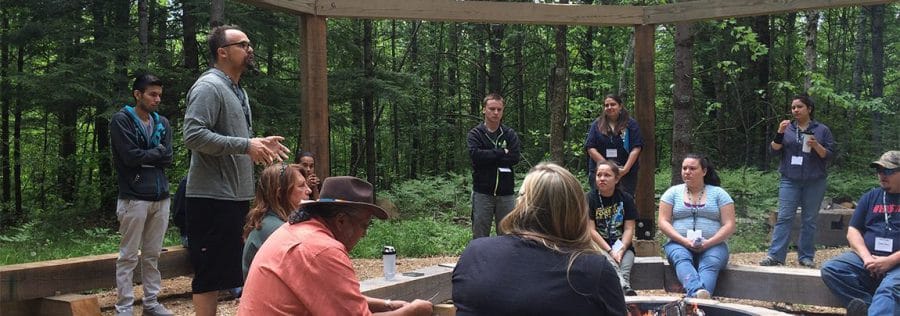Kyle Powys Whyte, who holds a doctorate in philosophy, focuses on social and environmental justice. His research often overlaps science and advocacy, sometimes with unexpected results.
The Citizen Potawatomi Nation member and Higbee descendant received his undergraduate degree in business administration at Babson College in Boston, Massachusetts. His interest in the Nation’s approach to business development inspired Whyte to become a businessperson. However, as he completed his bachelor’s degree, Whyte recognized his passion for a completely different subject matter.

“I was really interested in understanding the philosophy of justice. You know, what does justice mean?” Whyte said. “So, that’s what really turned me more to the humanities.”
He then attended graduate school at Stony Brook University in Stony Brook, New York. Today, Whyte works as an associate professor of philosophy and community sustainability at Michigan State University as well as a faculty affiliate of the American Indian & Indigenous Studies program. In 2015, he became the Timnick Chair in the Humanities at MSU. He hopes to be awarded full professorship this year.
Classroom strategies and climate change
“I’ve really tried to be the type of professor that emphasizes our people and Indigenous people more broadly,” he said. “There’s obviously a lot of learning to do, but I’ve really worked hard to try to serve as a mentor to the students I work with. I try to empower them with positive energy about their careers and their futures.”
He teaches a course called Global Climate Change: Collective Action and Citizenship. Covering the basics of earth’s warming, it discusses various viewpoints and possible solutions.
“We start off by looking at Indigenous traditions of understanding climate change and then fast forward to the current climate change issue,” Whyte said. “I think it’s helpful for people to see that something that today strikes people as a new topic — climate change — for Indigenous people, is actually a very old topic.”
He uses what he refers to as “an Indigenous approach to education.” During hands-on group assignments, the students work together to find solutions to the problems Whyte presents. The tasks call for creating presentations and exploring real-world situations, which he said they enjoy.
In Whyte’s own research, he examines Potawatomi and similar cultures dating back to pre-European contact. He analyzes global warming through the context of forced relocation and assimilation, which tells him a significant amount about Tribal society and history. This includes multiple Citizen Potawatomi resettlements from the Great Lakes region to Kansas and Oklahoma.
“What does it mean for an Indigenous people or other groups to confront a new climate system and have to figure out ways to cope, and survive, and eventually flourish?” Whyte asked.
He calls the perception of human-caused climate change as a new issue a “huge irony.” Potawatomi societies flourished by synchronizing with the surrounding environment and adjusting their lifestyle according to the season. The European immigrants then forcibly displaced the Nishnabe for commercial development of the Great Lakes region.
“(It) was precisely to cultivate fossil fuel industries, to cultivate deforestation and other land use, which we now know are drivers of climate change,” Whyte said. “And now, it’s Indigenous people who are affected by the ultimate outcomes of that industrialization.”
Science fiction and colonization
Earlier this year, Whyte wrote an article considering the links between Native Americans, the founding of the United States and global warming through the lens of apocalyptic science fiction.
In the subgenre, a branch of humanity nearly ceases to exist in some sort of dystopian society. After being subjugated through colonization or an invasion, survivors no longer recognize their surroundings and must answer to a new, more powerful civilization.
Potawatomi, who survived forced relocation from the Great Lakes Region to present-day Kansas, lost the relationships with their surroundings and resources they spent hundreds of years developing.
“From our ancestors’ perspective, we’re actually living in the science fiction time that they would have maybe even feared, right? A time where we don’t have as much access to land, where we’re trying to rebuild our culture. We’re trying to find strategies to flourish even though we face a lot of discrimination,” he said.
“I realized that when you go to a movie and you see science fiction, oftentimes, it’s suggesting a future scenario that we would really dread. But actually, for a lot of Indigenous people, we’re already living in the science fiction scenario, and we’re actually trying to work our way out of that,” Whyte said. “It’s a difference in perspective, I think.”
Whyte points to CPN’s efforts such as the Gtegemen (We Grow It) Community Garden, environmental department and eagle aviary as evidence of the Tribe’s growth and reinvestment in ancestral culture. Several CPN members also organize seed banks to cultivate rare crops and develop food sovereignty.
“It’s a way of rebuilding our sense of identity about who we are, and so I don’t think it’s surprising that in dealing with the tremendous trauma that we’ve been through that our Tribe is actually trying to renew and revive some of these plants and connections with animals that were lost,” he said.
Apocalyptic science fiction also often explores the politics of two groups trying to understand each other. The Potawatomi and colonizers held differing priorities regarding political philosophies. The history of treaties and fur trade provide examples of these variations in lifestyle. Whyte enjoys studying this section of Tribal history as well. He said rights, contracts and property dominate Western viewpoints while Indigenous intellectual traditions often focus on mobility, adaptability and community or kinship.
“I really think that if children in school and teenagers in school were taught our traditions alongside the ones that they are taught now, people’s minds would be much more open,” he said. “And I think they’d be more creative in the way that they pursue justice and a clean environment today.”
To read Kyle Powys Whyte’s academic articles,
